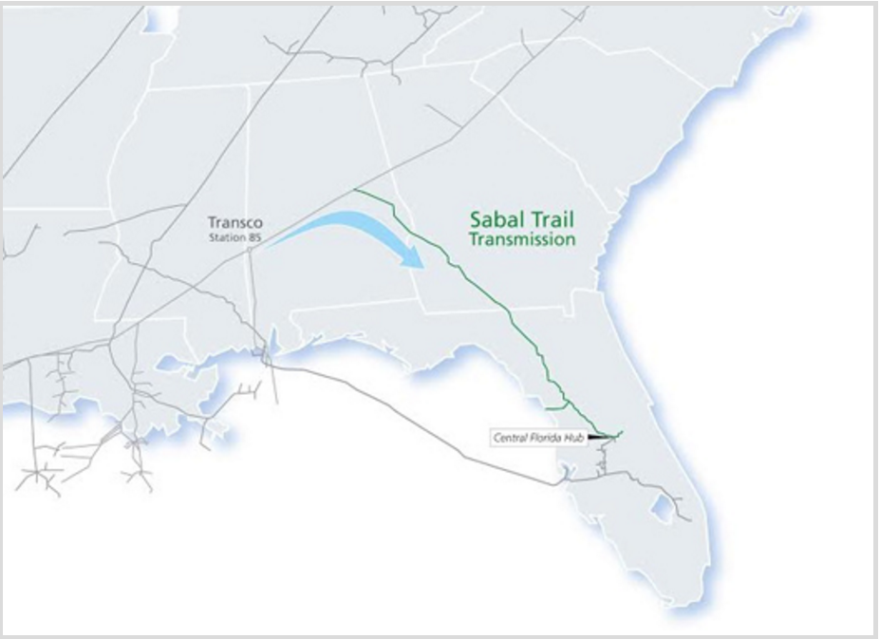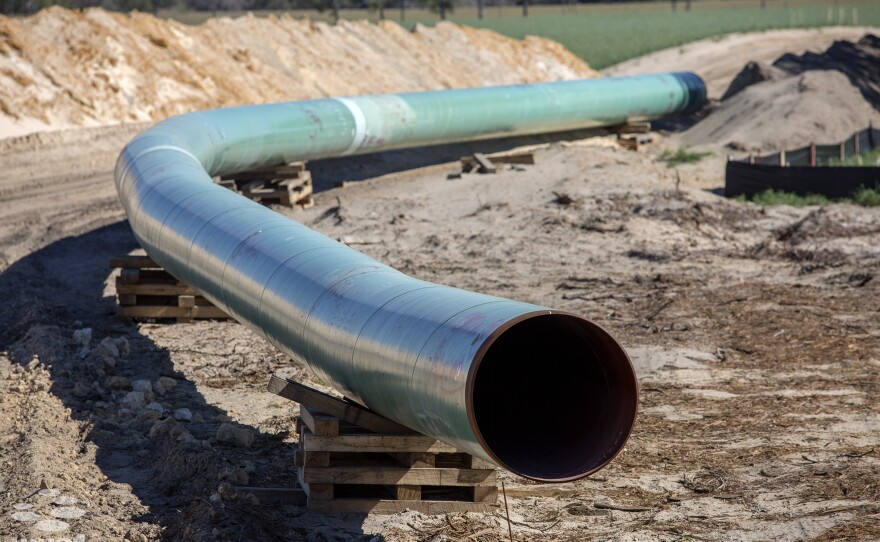“Hey, hey! Ho, ho! Sabal Trail has got to go…”
About 50 protesters in downtown Tampa in November chanted as they marched up and down Ashley Drive with signs that said "Protect our water" and "Solidarity with Standing Rock." This protest is one of many that have sprung up across Florida since construction began on the Sabal Trail Transmission Pipeline last summer.
The 515-mile underground natural gas pipeline starts in Alabama and stretches through Georgia. It enters north Florida near Interstate 75 in Hamilton County, then winds through eleven other counties before connecting to the Florida Southeast Connection pipeline east of Kissimmee. (Click here for a county-by-county route and maps from Sabal Trail Transmission.)

While the Federal Energy Regulatory Commission signed off on it about five years, ago, most people are really just now taking notice, in large part because of the high profile Dakota Access Pipeline in the Midwest, where members of the Standing Rock Sioux Tribe, along with environmental activists from around the country, were recently forced to leave their camp or face arrest.
Activists from around the country have formed their own water camps and protest events, both in solidarity with Standing Rock, and in protest against local pipelines, like Sabal Trail.
"So the pipelines are the topic du jour and I don't see it as a bad thing,” said Adam Dubbin, an environmental archeologist working on a documentary called “Save Florida Waters Now."
Katie Daly, who organized the Tampa protest, mostly focused her energy on animal rights until recently. She couldn't travel to North Dakota, so she organized a demonstration at Curtis Hixon Waterfront Park as part more than 200 national “Day of Action” rallies across the U.S. protesting the Dakota Access Pipeline. The Day of Action was called for by indigenous leaders in support of the Standing Rock Sioux tribe.
“We had an overwhelming response of people asking about the Sabal Trail pipeline and it actually had us look more into it,” Daly said.
Spring Hill resident Anita Stewart has been fighting the pipeline for about three years, well before construction started. Her Facebook group, “Stop Sabal Trail Pipeline,” has more than 7,000 members. Most of them joined in recent months.
“In all my talks and interactions with Florida residents, Floridians, they just didn't even know that this was occurring in their own backyard,” Stewart said. “So all of a sudden we started to get a lot of people coming to the group wanting more information.”
The Tampa rally - as well as protests closer to the pipeline - all address the same thing. People are worried about gas leaks, water contamination, and explosions at compressor stations located along the pipeline.
They're also citing concerns about the destruction of rare plants and nests for endangered species like the gopher tortoise and Florida scrub-jay.
Mikayla Haak, a member of Yankton Sioux Tribe, moved to Florida from South Dakota last year. She said many pipelines around the country run through native land, but the issue goes beyond that.
“It’s not just a native issue,” Haak said. “It’s not just a climate issue. It’s a people issue. It’s a human issue. We need to stop all pipelines. We need to stop being dependent on fossil fuels, stop being dependent on energy that isn’t renewable.”
A Sabal Trail spokesperson did not respond to requests for an interview about the allegations, but the company's website says that “natural gas transmission pipelines (are) one of the safest forms of energy transportation” and that Sabal Trail will comply with rules "minimizing disturbance to vegetation and providing for stabilization of impacted areas to mitigate direct and indirect impacts to wildlife.”
The pipeline is a joint venture between Spectra Energy, which operates pipelines through Canada, NextEra Energy and Duke Energy.
Dubbin said all these issues are the kinds of rallying cries that bring environmentalists of all backgrounds together.
“It’s not different than some of the other things we’ve seen in the past,” Dubbin said. “You allude to the save the whales back in the 80s; here in Florida we had a ban in the nets in the 90s, ... which was huge movement, a huge success for all us environmentally conscious Floridians."
Most of the roughly two dozen activists arrested so far over the Sabal Pipeline were at or near construction sites in three North Central Florida Counties – Levy, Gilchrist and Suwannee. Many were charged with trespassing, or resisting arrest while obscuring their faces with bandanas.
On Sunday, the pipeline made headlines again, when a deputy shot and killed a pipeline protester who allegedly waved his gun at police.
The Marion County Sheriff's Office said a deputy shot James Leroy Marker, 66, of Chokoloskee after responding to reports that he was shooting at Sabal Pipeline equipment Sunday Highway 200 in Dunnellon.
Eighty miles northwest of Dunnellon, Cindy Noel owns and lives on about five acres of land in Branford, a town in rural Suwannee County. The pipeline runs close to her property and she's worried about well water contamination and explosions.
Last November, she was arrested near a construction site.
"I spent a night in jail,” Noel said. “I wasn't given a phone call. I was not told what I was arrested for -- just taken in and held.”
She said she wasn't an activist then, but she is now.
“That made me more active because they arrested me for doing nothing more than taking pictures on a county road,” Noel said.
Similar scenes are being played out all along the pipeline, which could complete construction as early as May. Even those not looking to pick a fight are finding themselves at odds with authorities.
Just a few weeks after Noel was arrested, Gilchrist County Sheriff's deputies pulled over a caravan of sight-seers looking at a pipeline construction site half a mile east of Branford. St. Petersburg resident Katherine Cavanaugh was behind the wheel of one vehicle.
Cavanaugh shouted as she was arrested.
"I did not do anything wrong!"
Deputy Jeff Davis tried explaining the situation.
"She was warned to give me her license, registration, proof of insurance,” Davis said. “She refused to do so. I told her if the refusal kept going, she was going to be arrested for obstruction. She continued to refuse. She was arrested."
(Click here for a copy of the arrest report.)
Some of the sight-seers and protesters are learning to accept that the pipeline completion is inevitable. But documentarian Adam Dubbin said this single pipeline isn't the end.
“There is a long game being played here that we're just now starting and we need to we need to use the awareness that we're getting from the pipeline to take us to the next step,” Dubbin said.
And that next step – he said - is preventing pipelines from being approved in the first place.
















